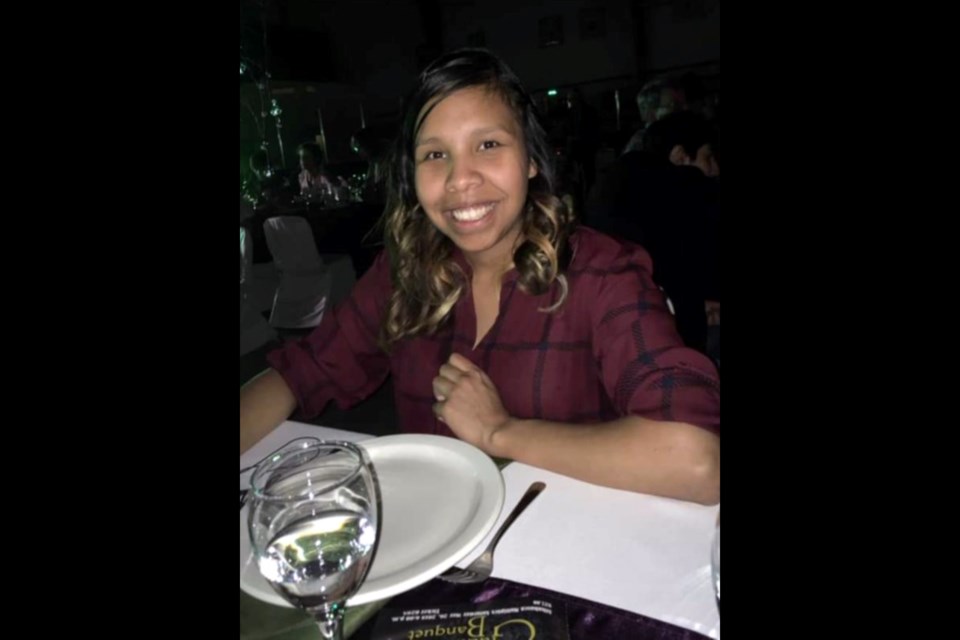ATHABASCA – Last month marked two somber anniversaries for the extended Thunder family and for Athabasca and the surrounding community, and now, just hours after announcing a fundraiser to help provide grave markers for Kelsey and Lee Thunder, a local resident is over the moon to be able to provide some solace in what is an inconsolable situation.
March 22 marked one-year since the murder of 23-year-old Kelsey Thunder at an Athabasca apartment complex. Her common-law partner Wyatt Thunder has been in custody since that day, charged with second-degree murder. A preliminary hearing on the charge, to determine if there is enough evidence to proceed, is scheduled to take place May 11, 12, 13, 19 and 20. The couple have three children together.
March 17 marked seven years since the death of 12-year-old Lee Thunder in 2015, after a hit-and-run accident on Highway 55 going up Athabasca’s east hill. Lee was struck by the vehicle as he and his older cousin Wyatt walked up the hill that evening.
The woman driving the vehicle that day pleaded guilty to careless driving, was fined $2,300 and her licence was suspended for two months. She thought she had hit a deer and continued to drive, but soon after hearing of Lee’s passing, she reported the incident to RCMP and fully cooperated with the investigation.
Neither Lee nor Kelsey currently have even a modest monument to mark their final resting places, but a family friend, with the help of the Athabasca United Church, set out to resolve that with a fundraiser to help provide a small ray of light to the beleaguered Thunder family.
Hillary Patterson has been friends with different members of the Thunder family for nearly a decade and has seen them have to cope with these three very real human tragedies. When she heard both graves still sit without a proper headstone, she started asking around local funeral homes to see what they could offer.
“Well, first I wanted to get a gravestone for Lee, I've been working on that for a while. And then that tragedy happened with Kelsey. So now I've decided to see if I can do this for both families, because they don't have the money to do that,” Patterson said April 2, adding they’re hoping to raise about $3,000 to cover the costs.
“Athabasca Community Chapel was able to offer me discontinued gravestones at a lower price, so we'll be saving a little bit of money that way and the United Church will be accepting and holding the donations until we get enough money.”
Just a few hours after the original article was published online, Patterson received a message from someone who would like to remain anonymous. They pledged the entire $3,000, saying the Thunders had been through so much and Kelsey and Lee deserved proper headstones.
“I thought it was a joke at first,” said Patterson April 4. “Then he sent a screenshot back of the confirmation that it was deposited to the church.”
She immediately called the Thunders, who were just as ecstatic as she was.
“I don't know what they were expecting, but they thought I had bad news or something, and when I told them, nobody had words, they're like, ‘Is this real?”
Rev. Monica Rosborough said it’s not often the United Church council is approached by a member of a community for such a project, but they were happy to take part and use their charitable status to accept and hold donations and issue tax receipts until the funds are raised.
“We've done some fundraising for projects like Ukraine or the Haiti earthquakes and things like that, so it's not outside the realm of what we've done in the past,” she said March 30. “We like to support the community and worthwhile projects whenever we can. We don't often get approached by a community member with such a situation, so this is a first for us, but we think it's a really good project.”
Not only that, Rosborough said the council sees it as a “passion project”, as the church continues to work towards truth and reconciliation with the Indigenous community, after operating its own residential schools until 1969. Though it operated only 14 of Canada’s 130 residential schools, the United Church has been working toward healing the trauma caused by these institutions through generations of Indigenous families, by making a concerted effort to understand and be responsive to the harmful effects caused.



